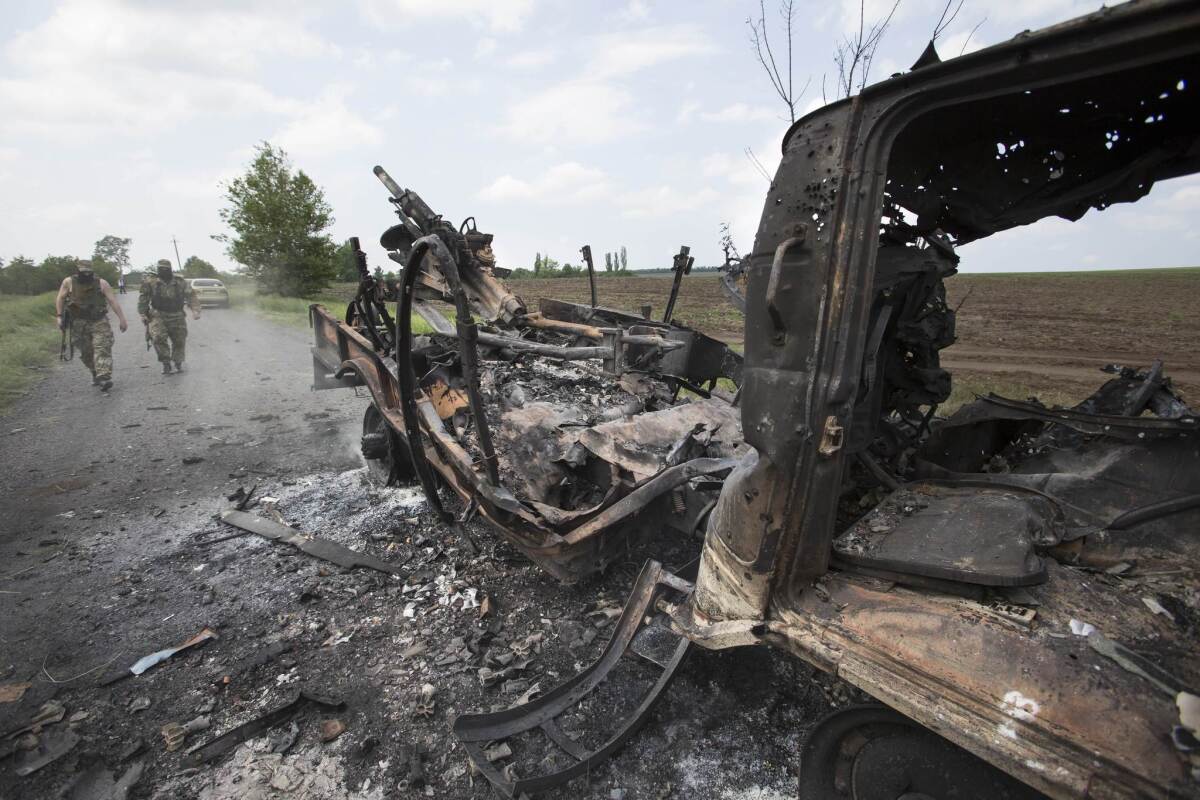Russian aggression driving Ukrainians toward EU, NATO, poll finds

- Share via
Reporting from Kiev, Ukraine — Russia’s annexation of the Crimean peninsula and alleged support of pro-Russia separatists elsewhere in Ukraine are driving more and more Ukrainians to seek alliance with the European Union and NATO, a Kiev social researcher reported Wednesday.
That is exactly the economic and security shift the Kremlin has been trying to prevent.
For the first time in more than a decade of polling Ukrainians on their attitudes toward the Western alliances, an absolute majority -- 52% -- said they favored steering Ukraine’s foreign policy toward the European Union, said Andriy Bychenko, sociological services director for the Razumkov Center.
The share of respondents preferring to orient Ukraine’s trade and political relations toward Russia was 16.6%.
The results were a qualitative drop from the nearly even split between pro-European and pro-Russian sentiments measured in previous polls since 2000, said Bychenko.
“The main reason for this change is the aggression by Russia against Ukraine,” the pollster said, charting the dramatic shift westward from Russia’s invasion of the Crimean peninsula in late February and its March 18 annexation of the territory after a hasty and widely condemned referendum.
The Razumkov Center’s latest survey was based on April 25-29 interviews with 2,012 adults across Ukraine -- except for in Crimea, where Ukrainian social researchers no longer have access. The peninsula’s 2 million residents represent about 4% of Ukraine’s 46 million population. The Razumkov Center survey reported a plus-or-minus 2.3% margin of error.
A plurality of Ukrainians remains opposed to joining the North Atlantic Treaty Organization, Bychenko said the latest survey results show, with 41.6% against joining the military bloc while 36% say they aspire to membership. But that sentiment too has shifted significantly in recent weeks from what has been consistently well over 50% opposed to alliance with the former Soviet Union’s Cold War adversaries, Bychenko said.
Russia has defended actions beyond its borders that are viewed as aggressive, as in the 2008 war against the former Soviet republic of Georgia, as necessary to prevent what the Kremlin sees as its historical sphere of influence falling under the sway of NATO.
“You can say that Russia doesn’t understand the reactions of Ukrainians to their actions,” Bychenko told journalists in unveiling the latest poll results. “Thanks to the actions of Russia in Crimea and eastern Ukraine, you have a situation where Ukrainians are becoming more pro-NATO.”
In an interview Wednesday with Bloomberg Television in Moscow, Russian Foreign Minister Sergei Lavrov reiterated the Kremlin’s fierce opposition to its neighbors joining the Western military alliance. Any attempt to bring Ukraine into the bloc would be “an issue for Russia,” Lavrov said, warning that Ukraine’s inclusion would hurt European security.
Russia’s top diplomat also said in the television interview that Ukraine was “as close to civil war as you can get,” with clashes between pro-Russia separatists and Ukrainian government forces having taken dozens of lives in the past two weeks.
Kremlin officials dispute claims by the interim Ukrainian government and its Western supporters that Moscow has fomented the unrest in eastern Ukraine. Early Wednesday, pro-Russia gunmen blocked a military base in Donetsk with what Ukrainian Defense Minister Mykhailo Koval said was overt involvement from Russia’s 45th Airborne Regiment.
The power struggle that has seen separatists occupy a dozen towns and cities in eastern Ukraine came to a head Sunday with dubious Crimea-style referendums that purportedly showed more than 90% of the populations of Donetsk and Luhansk regions in favor of independence from Ukraine.
Russian President Vladimir Putin had urged the separatists to postpone their unsupervised votes, which Ukraine’s interim government denounced as a farce and the European Union and United States deemed violations of the Ukrainian Constitution as well as international law.
The Kremlin has issued only a vague statement saying it “respects” the will of the separatists for independence and has not responded to an appeal from the self-styled People’s Republic of Donetsk for annexation to Russia.
The chairman of Russia’s lower house of parliament added his voice Wednesday to a reluctant but growing chorus acknowledging that Ukraine’s May 25 presidential election should go forward to restore legitimate leadership in the country.
“It’s hard to imagine that this election could be fully legitimate,” State Duma speaker Sergei Naryshkin told Rossiya-24 television, referring to ongoing Ukrainian government operations to recover control of eastern areas from the pro-Russia militants. “But it’s obvious that the failure to hold the election would lead to an even sadder situation, so it’s necessary to choose the lesser evil.”
Ukraine’s last elected president, Viktor Yanukovich, fled to Russia in late February after he was ousted by a three-month rebellion sparked by his decision to abandon an association agreement between Ukraine and the European Union that had been in the works for three years.
More to Read
Sign up for Essential California
The most important California stories and recommendations in your inbox every morning.
You may occasionally receive promotional content from the Los Angeles Times.














